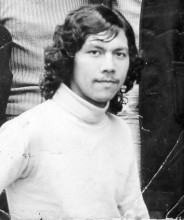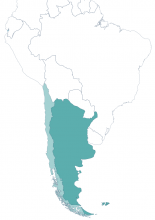Luis Enrique Elgueta Díaz was born on September 26, 1953, in Santiago, Chile, and was the eldest of three siblings (Carlos and Laura). From an early age—motivated by his father, a sports teacher—he showed a keen interest in basketball and music, and although he played in youth leagues, it was ultimately music that defined his higher education when he enrolled in 1970 to study Music Education at the Conservatory of the University of Chile. At the age of 18, he became the father of his only daughter, Paula Alejandra, who was born in January 1972 and was his greatest joy, as he himself pointed out.
Since he was a teenager, he showed a keen interest in the political events taking place in his country and became involved in the Revolutionary Left Movement (MIR), where he worked mainly in the cultural field.
When the coup d'état took place in September 1973, and despite the fact that part of his family moved to Argentina, Luis did not want to leave the country. He never accepted the fate suffered by many of his friends and comrades and, despite the dangers this posed for activists, he decided to work hard against the dictatorship.
After separating from his daughter's mother, he began a relationship with Argentine citizen Clara Haydee Fernández, and the couple settled in the southern part of Santiago.
Unfortunately, the heavy repression of the time led to the detection of the group of comrades with whom he was active in one of the many Resistance Committees fighting against the dictatorship. This led to the kidnapping and disappearance of at least six people, all of whom have been missing since June and July 1976. They are: Oscar Avello Avello, Patricio Guarategua Quinteros, Miguel Ovalle Narváez, José Santos Hinojosa Araos, Héctor Contreras Rojas, and Sergio Fuenzalida Loyola.
This situation forced Luis and Clara to leave Chile and seek refuge in Buenos Aires, but 25 days after legally entering Argentina, on July 27, 1976, they were kidnapped from their home at 2861 Chiclana Avenue in the capital city. Clara's sister, Cecilia del Carmen Fernández, who lived with them, was also kidnapped. Since that night, the whereabouts of all three have remained unknown.
The year after Luis, Clara, and Cecilia were kidnapped, on July 12, 1977, the Elgueta Díaz family home in Buenos Aires was raided and Luis's younger sister, Laura Elgueta, and his sister-in-law, Sonia Díaz, were kidnapped. The operation was led by Argentine Federal Police Commissioner Antonio Benito Fioravanti, with the participation of Chilean National Intelligence Directorate (DINA) agent Arancibia Clavel. Laura and Sonia were taken to the “Club Atlético”, a detention center in the San Telmo neighborhood of Buenos Aires and interrogated by Chilean and Argentine agents. At that time, they were informed that Luis had been transferred to Chile, where he “had scores to settle.”
Commissioner Fioravanti threatened the women with being transferred to Chile as well, implying that this was common practice at the time. Eight hours later, Laura and Sonia were released, warned not to report what had happened and to stop looking for Luis. The next day, Fioravanti called the family home to tell Laura's mother that “the girls” had escaped the same fate as her son, but that they had to leave Argentina immediately, which they did: a few days later they traveled to Mexico. In February 1978, Luis's father, Luis Elgueta, and mother, Ruth Díaz Vargas, also had to leave Argentina due to repeated threats and arrests suffered by Luis's mother for her search—along with other mothers and relatives—for her son.
Despite all the complaints and actions taken by the family, no information has ever been obtained about Luis and the Fernández sisters.
The case of Luis Elgueta Díaz was one of 23 cases involving Chilean citizens that were part of the “Operation Condor” trial held in Argentina, the verdict of which was announced on May 27, 2016, resulting in the conviction of 15 Argentine agents and one Uruguayan agent. During the trial, several habeas corpus petitions and complaints filed with international organizations, tirelessly pursued by his family, were submitted to the prosecution.
The case of Luis Elgueta Díaz was investigated and acknowledged by the so-called “Rettig Commission” in Chile and the CONADEP Commission in Argentina.
This text was written by his sister, Laura Elgueta Díaz, and translated by Odette Magnet Ferrero.


